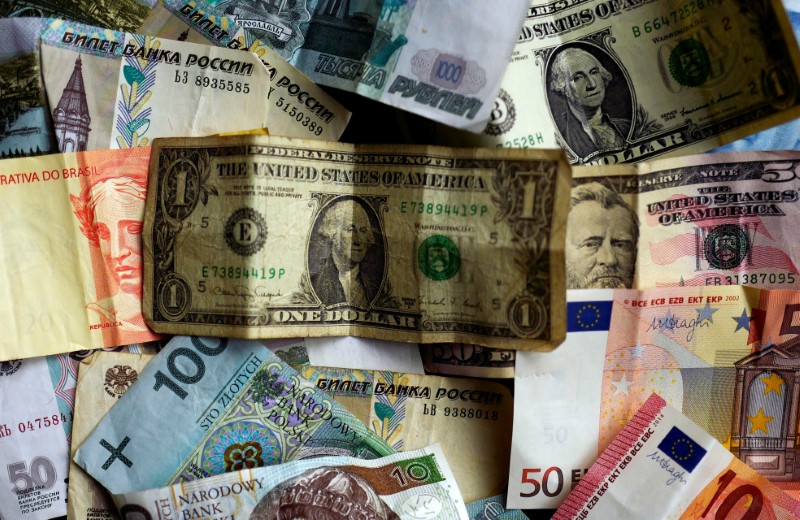By Ross Finley
LONDON (Reuters) - Stock markets have spent the year rising on bets of a resurgence in inflation, while central bankers trying to manage the global economy have spent the same time repeatedly reassuring everyone it's just around the corner.
Policymakers gathering at an annual monetary retreat in Jackson Hole, Wyoming in the coming week no doubt will be collectively pondering why the textbook rule that says low unemployment leads to labor shortages, then higher wages, and then in turn higher inflation, isn't working.
Yet the global economy is growing strongly. Apart from the risk of a stock market correction, there is no evidence of disinflationary threats like those that emanated from the financial crisis that started to smolder a decade ago.
The latest Reuters Polls of more than 500 economists covering more than 45 economies around the world showed almost no move in inflation expectations since the start of the year.
In the United States, where the Federal Reserve is raising interest rates, inflation pressures are in an extended lull, which has led to contorted arguments trying to explain it away.
Omair Sharif, senior U.S. economist at Societe Generale (PA:SOGN), in a recent note titled "All my exes", criticizes a recent tendency to search for suitably favorable core measures of inflation - stripped of, or "ex-", whatever components are holding it down.
"In short, while the core CPI undoubtedly looks better when you strip out sizable price declines, all these 'ex' measures still show a softening in the core rate that began in January," he wrote. "Moreover, as we have noted before, the transitory excuse is long past its sell-by date."
Analysts who follow the European Central Bank have been equally disappointed that after spending 2 trillion or so euros buying mostly government bonds it's only running 1.3 percent euro zone inflation, still well below the 2.0 percent ceiling. Some measures of core inflation are even lower.
Frederik Ducrozet, economist at Pictet, has taken heart from a recent trend move higher in the "super core" euro zone inflation rate, which excludes the cost of package holidays.
The trouble is, the euro is on a tear higher. That is a reflection of vastly improved economic performance by many euro zone economies this year, but as the common currency climbs, it acts as a drag on exports and tamps down imported inflation.
Flash euro zone purchasing managers' surveys in the coming week are likely to show continued strong business activity, but with tame price rises.
ECB chief Mario Draghi, who famously sent shockwaves at a speech in London one month before the Jackson Hole summit five years ago proclaiming he would do "whatever it takes" to save the euro, will not be making major policy comments. To some, that underscores how little progress there is to discuss.
"This in itself suggests that the Governing Council remains to be convinced that it should announce its QE tapering plans at its next meeting (in) September," notes Victoria Clarke, economist at Investec.
Fed Chair Janet Yellen will also speak. However, with minutes from the Federal Open Market Committee's latest deliberations showing concern about soft inflation, she is not likely to give new guidance on policy.
Indeed, arguably the biggest influence on U.S. inflation in the near term is completely out of the Fed's control.
Come September, the reality may hit that prospects for sweeping U.S. tax cuts, one of President Donald Trump's biggest election promises and the basis of a surge in business confidence since he won the White House, have stalled.
If the stock market gets a chill, the Fed may no longer be able to rely on an argument regularly touted by New York Fed Chief William Dudley that looser financial conditions justify the case for tighter monetary policy.
But the weak inflation trend is not confined to the United States, Europe and, of course Japan. With few exceptions, national statistics show inflation remains low just about everywhere.
India, forecast in the latest Reuters polls to be the world's top-performing economy this year with more than 7 percent growth, and also an economy notorious in the past for running persistently high inflation, reported inflation hit a record low of 1.54 percent in June.
The Reserve Bank of India cut interest rates into that roaring strength the same month inflation hit a record low.
South Africa, emerging from recession, is running inflation below historical averages and its central bank may cut rates again as soon as next month, and most likely by November, according to the latest Reuters poll.

Even in Brazil, which is beginning to emerge from its worst recession in about a century, inflation has crashed from more than 11 percent last year to below 4 percent, leading the central bank last month to lower its inflation target.